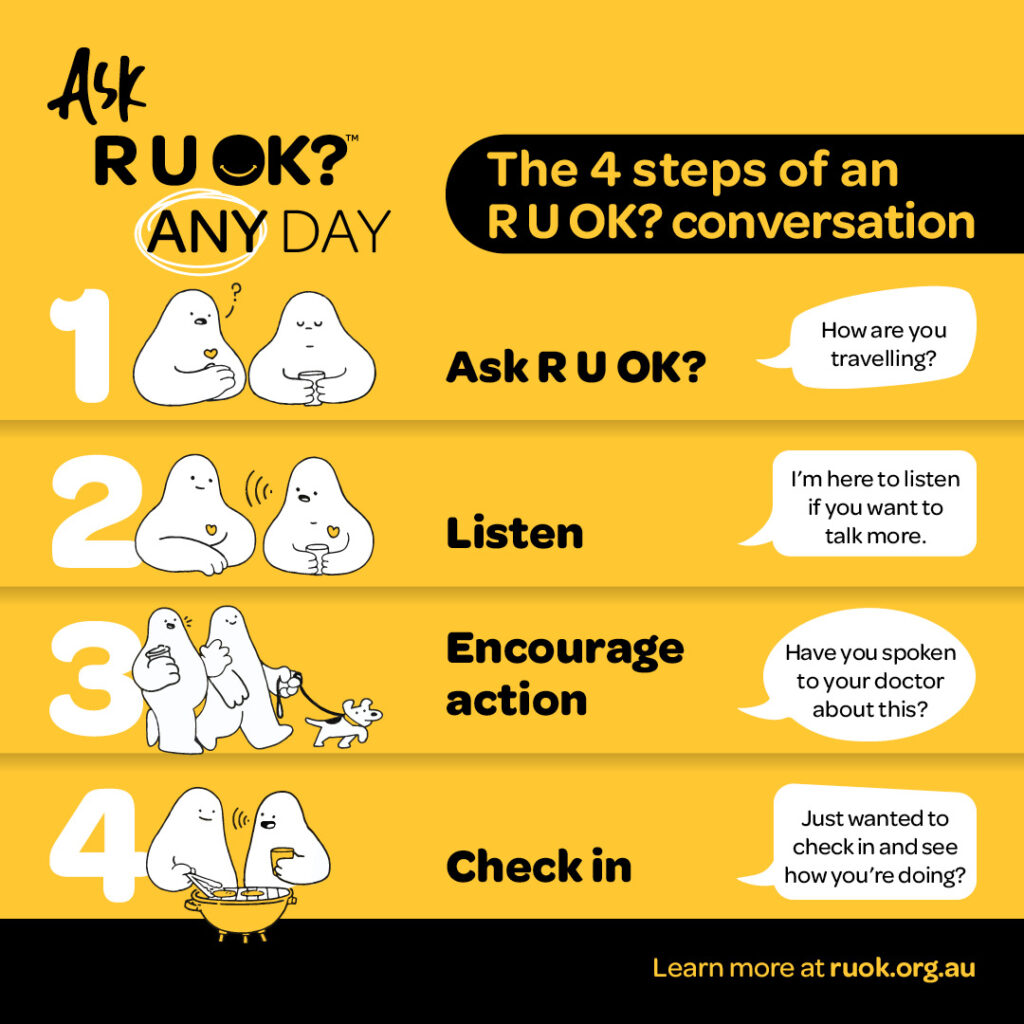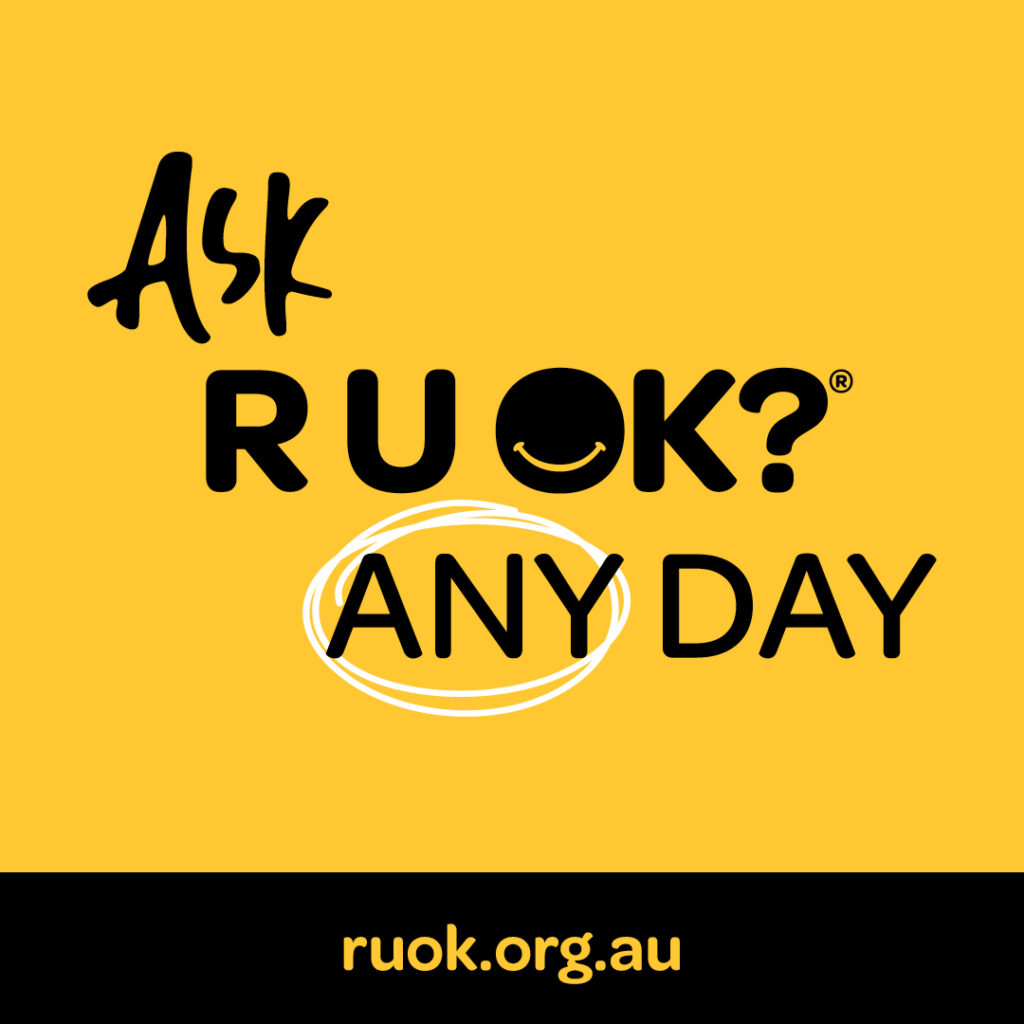Mental health is just as important as physical health, yet many of us find it difficult to talk about. Every year, R U OK? Day reminds us to check in with the people around us, start meaningful conversations, and show genuine support. At our clinic, we know that wellbeing is more than just injury recovery or physical strength – it’s about looking after the whole person. Holistic care ensures we address other all the issues which may hinder recovery and contribute to persistent pain.
In this article, we’ll explore what R U Okay? Day is all about, why it matters, how you can start supportive conversations, and how mental health connects to your physical health.
What is R U Okay? Day?
R U OK? Day is a national day of action in Australia dedicated to raising awareness around suicide prevention and mental health. Held every September, the campaign encourages all of us to ask a simple but powerful question: “Are you okay?”
The day was founded in 2009 by Gavin Larkin, who wanted to honour his father, Barry, who died by suicide. Gavin’s vision was to reduce the stigma around mental health and create a culture where people feel safe to talk about their struggles.
The message is simple: By starting conversations and offering support, we can make a difference in someone’s life.
Why R U Okay? Day Matters
- Suicide prevention: Suicide remains one of the leading causes of death in Australia, particularly among young people. Talking openly can reduce isolation and provide hope.
- Breaking the stigma: Many people feel ashamed to admit they’re struggling. R U Okay? Day normalises asking for help.
- Stronger communities: Checking in with friends, family, or colleagues strengthens social connections, which are vital for mental wellbeing.
Mental health challenges often go unseen. Just because someone looks fine on the outside doesn’t mean they aren’t experiencing stress, anxiety, or depression. That’s why asking “R U Okay?” can be the first step to meaningful change.
How to Ask: The 4 Steps of R U Okay?
R U Okay? provides a simple four-step framework to guide supportive conversations:
1. Ask R U Okay?
Choose a time and place where you both feel comfortable. Be relaxed and genuine. For example:
- “I’ve noticed you’ve seemed a bit down lately. Are you okay?”
- “How have things been going for you?”
2. Listen with an Open Mind
Avoid rushing the conversation or offering solutions straight away. Give them your full attention, show empathy, and don’t judge.
3. Encourage Action
If they’re struggling, encourage small steps forward. Suggest talking to a GP, psychologist, or counsellor. Offer to go with them if that makes it easier.
4. Check In
Don’t let the conversation end after one chat. Follow up in the days or weeks after to show ongoing support. A simple text like, “Just checking in, how are you doing today?” can mean a lot.

The Link Between Physical Health and Mental Health
At our clinic, we often see how physical and mental wellbeing are closely connected. Chronic pain, injuries, or reduced mobility can take a toll on someone’s emotional health. Likewise, high stress or mental health struggles can slow down physical recovery and contribute to persistent pain.
For example:
- Chronic pain and anxiety: Long-term pain can lead to feelings of hopelessness or depression. Excessive worrying can lead to a fear of movement which can be an obstacle to recovery and progress.
- Exercise and mood: Regular physical activity boosts endorphins and reduces stress.
- Rehabilitation and motivation: A positive mindset is key to sticking with rehab programs and reaching recovery goals.
That’s why we encourage a holistic approach – supporting both body and mind. By checking in on mental health, we can improve physical recovery too.
Tips for Supporting Mental Wellbeing
Whether it’s R U Okay? Day or any day of the year, here are some ways to promote better mental health for yourself and others:
- Stay active: Exercise regularly to improve mood and reduce stress.
- Connect socially: Make time for friends, family, or community groups.
- Rest and recover: Prioritise quality sleep and relaxation.
- Seek help early: Don’t wait until things feel overwhelming – see your GP or a mental health professional.
- Practice mindfulness: Deep breathing, yoga, or meditation can calm the nervous system.
How Our Clinic Can Help
At Logan Physio, we believe health is not just physical – it’s about supporting your overall wellbeing. Whether you’re dealing with an injury, ongoing pain, or stress-related tension, our physiotherapists take a personalised approach to help you feel and function better.
If you or someone you know is struggling, remember that reaching out for support is a sign of strength. Alongside professional mental health services, our team can help with:
- Reducing physical pain that impacts mental health
- Creating exercise programs to boost mood and mobility
- Address fears around moving that may be stopping you from living your best life
- Supporting stress management through movement and recovery strategies
???? Book an appointment with our clinic today to take the first step toward better health and wellbeing.
Final Thoughts
R U Okay? Day is more than just a date on the calendar – it’s a reminder that every day is an opportunity to check in with those around us. A simple conversation can change a life.
Next time you notice someone might be struggling, don’t hesitate. Ask the question, listen, and show you care. Together, we can build a healthier, more connected community.
If you’d like support with your physical and mental wellbeing, our team at Logan Physio is here to help.
Helpful Resources
If you or someone you know needs immediate support:
- Lifeline: 13 11 14
- Beyond Blue: 1300 22 4636
- Suicide Call Back Service: 1300 659 467


